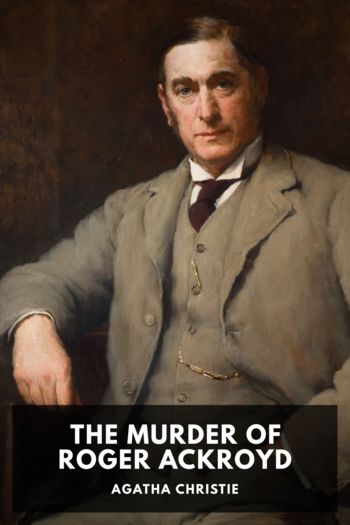The Clerkenwell Tales Peter Ackroyd (nice books to read TXT) 📖

- Author: Peter Ackroyd
Book online «The Clerkenwell Tales Peter Ackroyd (nice books to read TXT) 📖». Author Peter Ackroyd
“After curfew.”
The body was indeed that of a Lollard who had been taken as a result of the riot during the Clerkenwell mystery; he had died in the gaol in Poultry Street, from a wound delivered to him by the parish clerk of St. Benet Fink with the aid of a wooden staff tipped with iron. He had not died in mercy, since no priest was willing to shrive him. No one would care what happened to the body of a heretic; Lambert need only say that, for fear of infection, he had tipped him into the lime-pit outside the walls.
That evening, two men could be seen carrying a sack across the Walbrook. It was not heavy work, and Lambert refused Gunter’s offer of wine. He looked angrily at his companion, Nicholay, who on principle accepted a drink of any description. They stood uneasily in the leech’s shop, their burden thrust on a bench in the corner, among bottles and phials, boxes and flasks, parchments and skulls of small beasts. They had little to say to one another.
“That wart is ripe for cutting.” Gunter was looking at Nicholay’s neck.
“Now, Master Gunter?” Nicholay seemed suddenly anxious.
“No. Not now. It is not the month for the neck. Taurus is the sign for neck and throat. A surgeon, Nicholay, may not cut any member of a man’s body until the moon is in its proper sign. Take your head.” Nicholay did not know how to accede to this request. “Aries, which is a fiery sign, moderately dry, governs the head with all its contents.”
“If any.” Lambert was eager to be gone.
“So when the moon is in Aries I am ready to operate upon your head and your face, or to open one of your head veins. A surgeon must also be an astronomer, you see. Similarly, consider your cod. Your testicles.” Nicholay was now staring at him very earnestly. “They lie in Scorpio.”
“You are wrong, master leech. They always lie in his wife. We must go now, Nicholay.” Lambert cleared his throat, and glanced towards the corpse. “But not without our silver.”
Gunter climbed the stairs to his hall, and returned with five shillings wrapped in a cloth. “May I ask you to carry him below?” The two gaolers were then directed down the stone stairs of an undercroft; in the vaulted space, there were hanging knives and saws and various small instruments. They put the sack upon a slab of marbled stone which was raised upon two thick columns of limestone.
After the men had departed, Gunter cut open the sack with a pair of shears and inspected the body. The smell of the prison was still upon it, so he washed it with a linen cloth soaked in turpentine. The body was slight and thin; it was worn, as Gunter observed out loud, with praying and sighing. Before he could begin his secret ministry, there were two other rituals which he wished to perform. He took a flaming candle from its sconce in the wall, and examined very carefully the eyes of the corpse; no image of the murderer could be seen, but during those moments the parish clerk of St. Benet Fink had the curious sensation of being watched. Then the leech smeared oil upon the thumbnail of the corpse, and scrutinised it closely for images immediately preceding the death. Once more there was nothing visible.
With a sigh he took down one of his knives, a newly sharpened instrument known by surgeons as “Follow me,” and cut into the breast of the body. Then he parted the ribs. One of Gunter’s passions lay in tracing the paths of the body’s spirits. He knew that the natural spirit resided in the liver, the vital spirit in the heart, the animal spirit in the brain; yet he wished to have some physical evidence of their operations. He concentrated first upon the liver. The livers of whales and dolphins smell like violets, little Lollard. How will yours smell?
On the following Sunday Gunter rode out at dawn into the countryside. After six days of work and study, he wished to refresh and recreate himself. He passed the crossroads of Gracechurch Street and Fenchurch Street on his way to Aldgate, where the poet Geoffrey Chaucer had once lived, and then he galloped out through the opened gate to the eastern fields past the Minories. It was a ride to reach them, however, since the road beyond Aldgate itself was marked and pitted by the scars of the horses, carts and wagons which passed this way in endless procession. There were wooden houses on both sides of the road, offering cheap lodgings for travellers, as well as ramshackle inns and dirty cookshops; there were myriad signs of hands, and plates, and flagons, to attract the vast army of wayfarers. The fields closest to the city had also become dumping grounds for all manner of refuse together with piles of stone and heaps of ashes, deep pits and marshy places. Yet beyond them lay the open fields. He rode for a few furlongs, until all that could be seen were the wooden shacks used by those who watched the crops at night for thieves and pilferers. The air was clearer here. He had read of all the gardens in the love visions, but nothing delighted him so much as the prospect of open country. It was quiet now, with only the sound of his horse trotting upon the road.
He heard someone moaning. There was a pony tied to a gatepost by the side of the road, and Gunter reined in his horse. There was a field beside him shielded with trees, but he could make out a figure walking across some patch of





Comments (0)